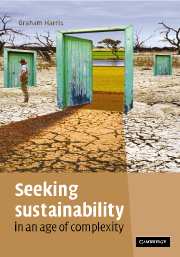Book contents
- Frontmatter
- Contents
- Acknowledgements
- 1 Preamble: the world we are in
- 2 Complexity and complex systems
- 3 New science, new tools, new challenges
- 4 The complexity of ecology
- 5 The generation of complexity
- 6 Micro-interactions and macro-constraints
- 7 A sense of place
- 8 Created landscapes and our changing sense of place
- 9 Catchment form and function
- 10 Catchment loads: ecosystem impacts
- 11 Change detection, monitoring and prediction
- 12 Evidence, uncertainty and risk
- 13 Modified landscapes: biodiversity
- 14 Function in fragmented landscapes
- 15 Environmental flows
- 16 Evidence for global change
- 17 Values and beliefs
- 18 Managing environmental, social and economic systems
- 19 Linking multiple capitals in a changing world
- 20 Community, capacity, collaboration and innovation
- 21 A new environmental paradigm
- 22 Emergent problems and emerging solutions: developing an ‘ecolophysics’?
- 23 Avoiding collapse
- Index
21 - A new environmental paradigm
Published online by Cambridge University Press: 21 March 2011
- Frontmatter
- Contents
- Acknowledgements
- 1 Preamble: the world we are in
- 2 Complexity and complex systems
- 3 New science, new tools, new challenges
- 4 The complexity of ecology
- 5 The generation of complexity
- 6 Micro-interactions and macro-constraints
- 7 A sense of place
- 8 Created landscapes and our changing sense of place
- 9 Catchment form and function
- 10 Catchment loads: ecosystem impacts
- 11 Change detection, monitoring and prediction
- 12 Evidence, uncertainty and risk
- 13 Modified landscapes: biodiversity
- 14 Function in fragmented landscapes
- 15 Environmental flows
- 16 Evidence for global change
- 17 Values and beliefs
- 18 Managing environmental, social and economic systems
- 19 Linking multiple capitals in a changing world
- 20 Community, capacity, collaboration and innovation
- 21 A new environmental paradigm
- 22 Emergent problems and emerging solutions: developing an ‘ecolophysics’?
- 23 Avoiding collapse
- Index
Summary
The challenge of rebuilding regions in an environment of decentralisation, pluralism and subsidiarity: the new ‘wickedly’ complex environmental paradigm.
So the challenge that is before us is to attempt to manage and restore multiple capitals and assets of different kinds (ecosystem structure, biodiversity, resources, the quantity and quality of water, human settlements) as well as their interactions across scales, and to do this at regional or watershed scales over time periods long enough to achieve something akin to intergenerational equity. Our starting place is from mostly highly modified landscapes and waterscapes and we must do this with limited resources and information. There have been many attempts to restore landscapes at local scales and many local successes but, overall, the indicators show that more needs to be done. Local successes do not eliminate large-scale decline – and vice versa. We must find ways of causing the whole to become more than the sum of the parts: there must be more integration and the exploitation of synergies and the benefits of SGC. It is clear that just scattering ‘best management practices’ across landscapes does not bring us to where we need to be; we need to find ways to exploit the non-linear interactions, synergies and emergent properties of the pandemonium of natural interactions (which we understand but poorly) to add value to what we may do ourselves.
- Type
- Chapter
- Information
- Seeking Sustainability in an Age of Complexity , pp. 294 - 308Publisher: Cambridge University PressPrint publication year: 2007



